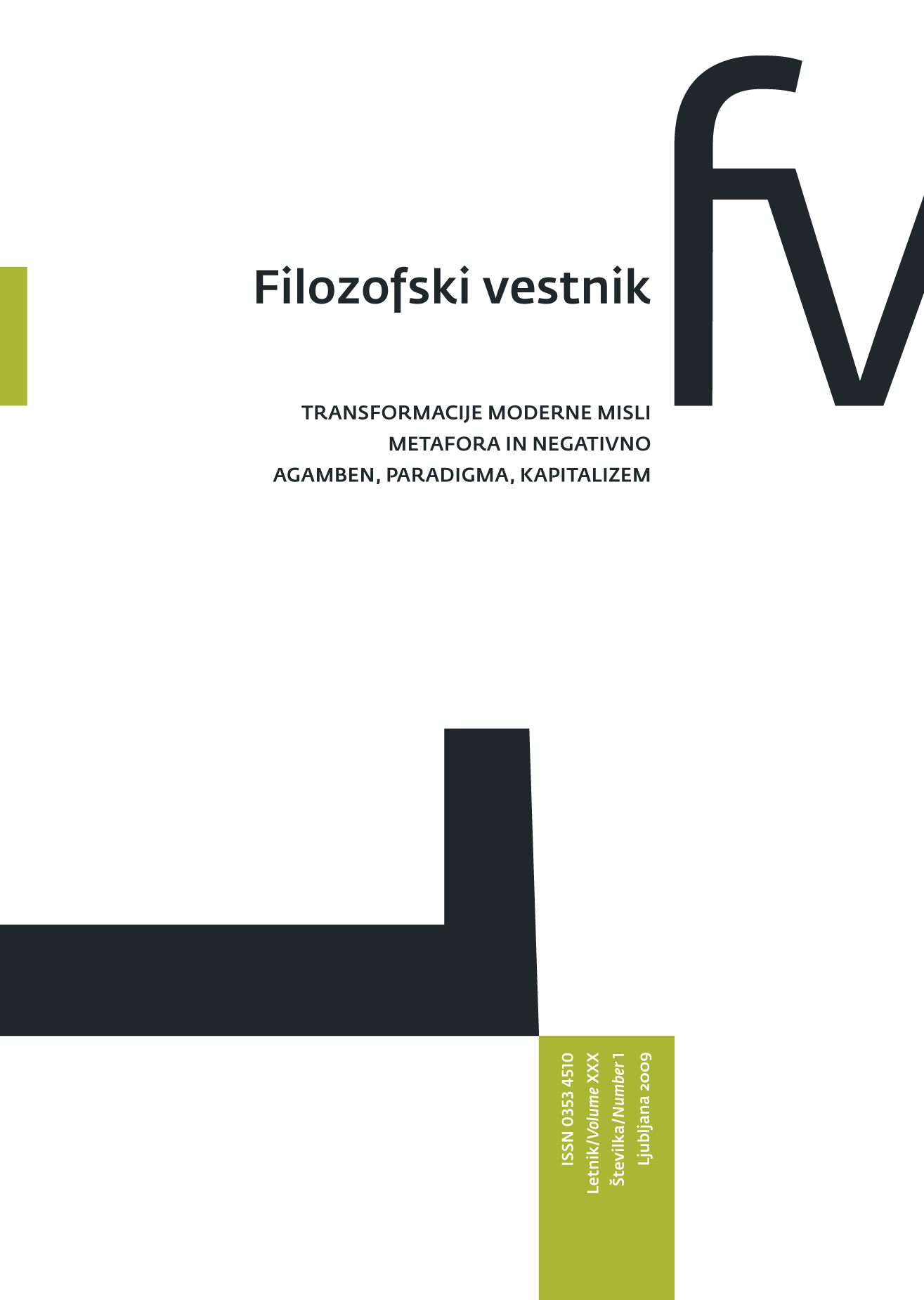Zmožnost ali sposobnost? Agambenovi odsotni subjekti
Ključne besede:
možnost, Aristotel, Agamben, praksa, jezik, Virno, subjektPovzetek
Zdi se, da Agamben s svojo paradoksno obravnavo zmožnosti pušča malo prostora za kakršno koli robustno teorijo subjekta, političnega ali siceršnjega. Posledica njegovega aristotelskega pojmovanja zmožnosti je zadnji instanci v tem, »da je zmožnost konstitutivno zmožnost ne (delati ali biti)«, kar napoteva na to, da četudi je zmožnost realizirana, je to samo zaradi manka njenega delovanja. Agambenovo aristotelovstvo je nit, ki se vleče skozi vse njegovo delo, in če se spomnimo na njegovo delo Človek brez vsebine, posebej na njegovo razpravo o Marxu, je jasno, da okvir zmožnosti pomeni, da je ne mogoče, da bi Agamben pri Marxu videl kaj drugega kot odvečno kombinacijo »metafizike volje«, Marxovega človeka pa kot neke vrste naravno, živo bitje. To kasneje odločilno oblikuje Agambenovo kasnejšo razpravo v Homo sacer o tem, kako zoe prebiva v polis, kar temelji na Agambenovi ugotovitvi glede golega življenja. Njegova stava, da namreč vprašanje »‘na kakšen način ima živo bitje govorico’, natanko ustreza vprašanju, ‘na kakšen način golo življenje prebiva v polis’«, živo bitje izenači z njegovimi političnimi, jezikovnimi in naravnimi zmožnostmi tako dokončno, da izgleda, da ni več nobenega prostora za kakršen koli zgodovinsko izjemen oziroma kolektivno precedenčen subjekt, proletariat ali kaj drugega, tak, ki bi prelomil z zgodovino oziroma prekinil obstoječi red. Agambenovo delo bi zlahka kritizirali s stališča marksizma, z vztrajanjem pri zgodovinski pogojenosti narave človeške zmožnosti in nujnosti, da oblike organizacije premislimo izhajajoč iz premikov v naravi dela. Da bi ostali blizu Agambenovemu aristotelstvu, ga je bolj produktivno primerjati z mislecem, pri katerem so vprašanja jezikovnih sposobnosti in politike prav tako v središču, prav tako pa ga prav tako blokira določeno kompleksno razmerje z naturalizmom. Gre za Paola Virna in v tekstu skozi vzporedno branje Agambenovega aristotelskega pojmovanja praxis in zmožnosti ter Virnovega dela o razmerju med jezikom in delom, skušamo pokazati konstitutivne razloge, zakaj Agamben ne more misliti kakršnega koli tipa substancialnega pojma subjekta, ter zakaj bi lahko Virnovo natančnejše pojmovanje sposobnosti, ki se opira tako na racionalistično kot na naturalistično teorijo, predstavljalo relevantnejšo alternativo.Prenosi
Podatki o prenosih še niso na voljo.
Prenosi
Objavljeno
2016-03-08
Kako citirati
Power, N. (2016). Zmožnost ali sposobnost? Agambenovi odsotni subjekti. Filozofski Vestnik, 30(1). Pridobljeno od https://ojs.zrc-sazu.si/filozofski-vestnik/article/view/4452
Številka
Rubrike
Agamben, paradigma, kapitalizem
Licenca
Avtorji jamčijo, da je delo njihova avtorska stvaritev, da v njem niso kršene avtorske pravice tretjih oseb ali kake druge pravice. V primeru zahtevkov tretjih oseb se avtorji zavezujejo, da bodo varovali interese založnika ter da bodo povrnili morebitno škodo.
Podrobneje v rubriki: Prispevki





